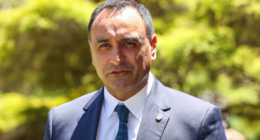Share this @internewscast.com
Australian boxing sensation Jasmine Parr achieved a stunning victory over her rival Efasha Kamarudin, securing a technical knockout in the fifth round on Wednesday night in Sydney.
The 22-year-old Australian powerhouse, daughter of renowned combat sports figure John Wayne Parr, overpowered her undefeated Singaporean contender with a fierce series of punches, pushing her fight record to an impressive 8-1 at the ICC Exhibition Centre in Sydney.
However, there was a controversial moment during the fight, when Parr appeared to throw her opponent over her shoulder.
Kamarudin advanced forward and swung a big right hook at Parr.
During the bout, Parr, whose previous fight occurred in May, skillfully evaded a major swing from the Singaporean, nimbly maneuvering as her opponent’s momentum took her away from the ropes.

Jasmine Parr clinched a significant victory against Efasha Kamarudin on Wednesday night, in a match that saw her curiously appear to toss her opponent over her shoulder.

Parr extended her winning streak to 8-1 on Wednesday night after sealing a fifth round TKO

Parr flipped her Singaporean opponent over her shoulder. Thankfully, Kamarudin did not land on her head and neck and avoided injury
Parr then stood up, lifting Kamarudin with her over her shoulder with a fireman’s carry.
She then flipped Kamarudin over her back, with the 34-year-old’s hips transitioning above her head, before falling to the canvas.
Thankfully, Kamarudin managed to twist her body in the fall, preventing her from landing on her head and neck.
‘That could have gone either way,’ the commentators on Kayo said.
The referee briefly paused the bout and gave Parr a warning over the illegal throw, with the fighter still going on to claim victory.
Fighting is deeply ingrained in Parr’s lineage, with her father, John, dubbed ‘The Gunslinger’, having won 10 world championships throughout his illustrious kickboxing and Muay Thai career.
He also boxed professionally too, having won 11 out of 14 professional fights, claiming knockouts in 10 of those.
Parr started her fighting career in kickboxing before transitioning to boxing, suffering just one career loss thus far, which came at the hands of Australian boxing star Shannon O’Connell last year.

Parr began her fighting journey practising kickboxing and would later transition into boxing, having only lost once in her career – a defeat by Aussie boxing queen Shannon O’Connell last year

Fighting runs in the blood for Parr, with her dad, John (pictured right with Anthony Mundine, left), who is also known as ‘The Gunslinger’, having claimed 10 world championships during his glittering kick boxing and Muay Thai fighting career.

Even Alexander Volkanovski has been impressed with her fighting ability and urged her to consider joining the UFC
Even Alexander Volkanovski has been impressed with her fighting ability, and perhaps after flipping her opponent over her shoulder in tonight’s bout, the Aussie MMA great might be even more keen to coax Parr to join the UFC.
Her manager is Ash Belcastro, who also represents the likes of Volkanovski.
‘I’d absolutely love for Jazzy to go to the UFC,’ Belcastro said to Fox Sports.
‘And we have spoken about it already.
‘Right now though, she’s shutting me down.
‘She has goals and aspirations in boxing and I respect that.
‘I’d actually love for her to achieve what she wants in boxing and then switch straight across to the UFC.
‘Because she’s a boxer who has also been a Muay Thai fighter, a kickboxer, and given her lineage … absolutely she can be a success there’.





